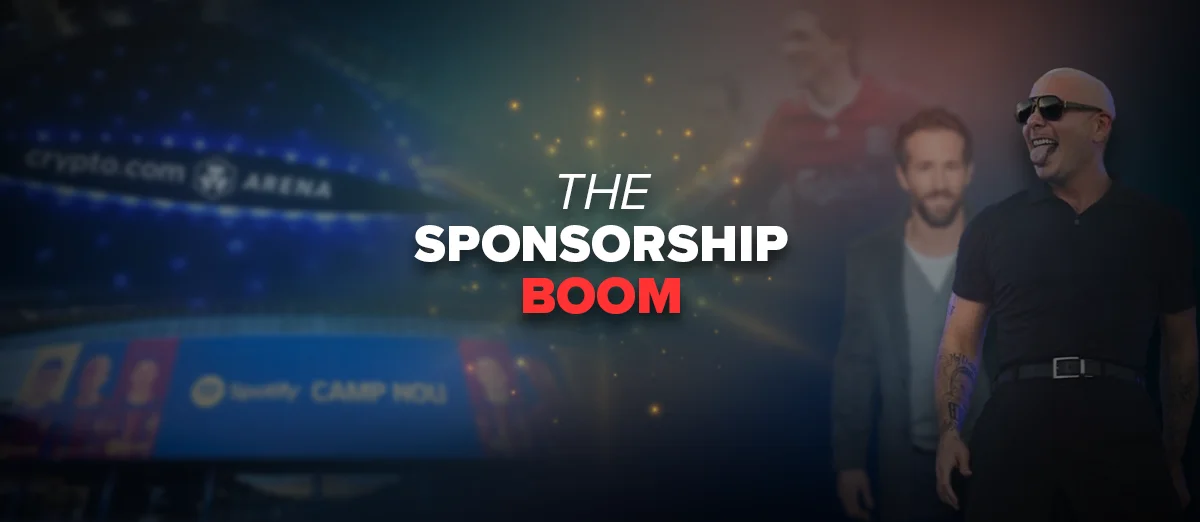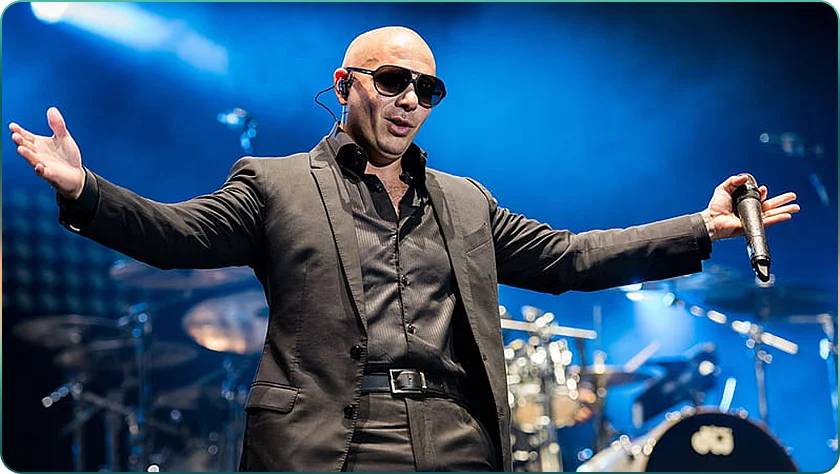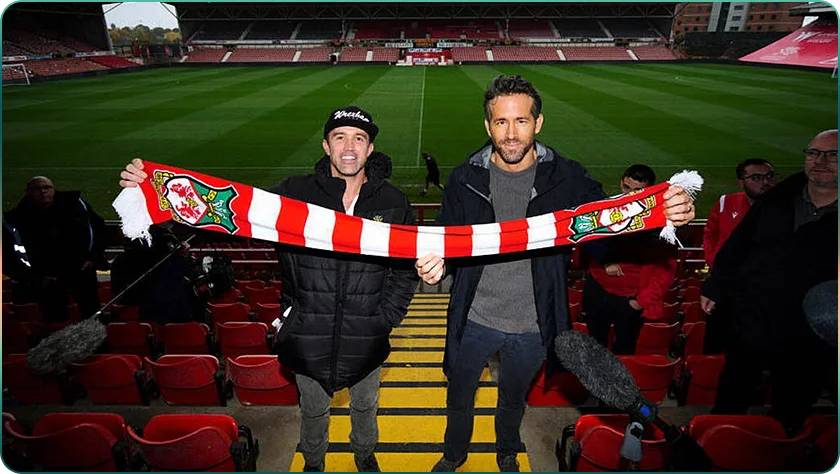The Surprising Brands Behind Today’s Sports Sponsorships

Streaming companies sponsoring soccer teams, crypto wading into American sports and even Pitbull getting in on the naming rights action — what’s going on with sports sponsorships right now?
Some time ago, Florida International University sold the naming rights to their 23,500-seat football stadium to a wealthy entrepreneur named Armando Christian Perez. The deal was worth $6 million. That might seem a hefty sum for a college football team, but aside from that there’s nothing too odd about this story so far.
However, look a little closer and you’ll see that Mr. Perez is in fact the international pop star and renowned provocateur, Mr. Worldwide himself: Pitbull. The Miami-born rapper signed the deal in August after FIU contacted him about a possible sponsorship. 18 months of negotiation ensued, before Pitbull added the stadium to his long list of business ventures (a list that also includes owning a NASCAR team). The deal grants Pitbull 10 days of rent-free stadium use every year, so he could well be throwing a concert or two at the ground in the near future. For now, it’s home to the FIU Panthers, who kicked off the season securing their first win in the Pitbull Stadium.
Sports stadiums and arenas are more than just places where fans gather to cheer on their favorite teams. They have become massive branding platforms, each venue carrying a name synonymous with companies that have little to do with sports. In recent years this trend has reached new heights, as tech giants, entertainment platforms, and even musicians have struck up sponsorship deals with sports teams. Let’s explore the origins of brand sponsorship in sports, the current explosion of esoteric naming rights deals, and what the future might hold.

The Evolution of Sports Sponsorship
The concept of sponsorship in sports is hardly new. Dating back to the early 20th century, companies saw sports as a means of reaching massive audiences. With sports betting’s iconic role in pop culture, that became even more so in our days. Brands who are now often associated with sports, like beer companies, were among the first to recognize the industry’s marketing potential. One of the most iconic examples is Carlsberg’s sponsorship of Liverpool FC, which began in 1992 and became one of the longest-standing relationships in the English Premier League.
Anyone who grew up watching English soccer in the 90s or 00s can picture Steven Gerrard in that crimson kit, with the German beer giants’ logo emblazoned across his Scouse midriff. Similarly, Heineken’s involvement with the UEFA Champions League has endured since the early 1990s, with the Dutch monoliths maintaining a presence in the ad breaks and on pitch-side hoardings at every single game in the competition.
Other famous examples include Coors sponsoring Chelsea, Chang beer sponsoring Everton, Carling sponsoring Rangers and Celtic, and Newcastle Brown Ale sponsoring Newcastle United. This association between alcohol brands and sports grew alongside the mass commercialization of sporting competition. As the common sports fan’s favorite drink, beer soon became intrinsic to the identity of many sports organizations through myriad deals between the companies who made it and the teams who wore their logos, deals which were mutually beneficial to the millionth degree.
As time went on, other industries saw value in aligning themselves with the passion of sports fans. Car manufacturers, telecommunications companies and banks began sponsoring teams and tournaments, creating a multi-billion-dollar industry of sports marketing.
By the early 2000s, football clubs were also attracting sponsors from the Middle East, with airlines like Emirates, Etihad, and Qatar Airways becoming synonymous with some of Europe’s biggest clubs. Arsenal’s Emirates Stadium and Manchester City’s Etihad Stadium exemplify this trend, as do the branding deals with clubs like Real Madrid, Barcelona and Paris Saint-Germain. Middle Eastern airlines saw European soccer as an opportunity to boost their global visibility, connecting their names to the most prestigious clubs and competitions.
But the recent wave of sponsorships has veered into more unexpected territory. Tech companies, live sports streaming services, cryptocurrency platforms, and even celebrities are now putting their names on sports facilities, further evolving the landscape of sports sponsorship.
Spotify Camp Nou: When Streaming Meets Football
One of the most notable recent examples is the renaming of Barcelona’s iconic, 65-year-old football stadium to Spotify Camp Nou. In a groundbreaking deal finalized in 2022, Spotify, the global music streaming service, became the main sponsor of FC Barcelona, taking over the naming rights to one of the most famous football venues in the world.
Barcelona’s decision to partner with Spotify came at a time when the club was dealing with significant financial difficulties. The Spotify deal, reportedly worth hundreds of millions of euros, was a financial lifeline for a club grappling with debt. The partnership also signals a shift in how brands view sports sponsorship. While a company like Spotify has no direct link to football, its involvement reflects the broader strategy of tech companies seeking to align with culturally iconic entities.
In Spotify’s case, it meant one of the most controversial companies in the music business — accused for years of not paying musicians a high enough percentage of the revenue generated by listener subscriptions and ads — partnering with a club renowned for its beautiful style of play, world-famous academy system, and players like Xavi, Andres Iniesta and Lionel Messi.
Years before the Spotify deal, Barcelona were one of the only clubs in world soccer whose shirts carried no sponsor. Following the Spanish Civil War, during which the club was involved in a number of anti-fascist movements, FC Barcelona’s higher-ups decided against shirt sponsors because they felt it didn’t fit with the club’s ethos — and didn’t need the money. In 2006 this finally changed, with the UNICEF logo appearing on their shirts, but even then the club didn’t make any money from it, with the deal simply born out of a willingness to promote the charity. Everything changed in 2011 when Barcelona signed a sponsorship deal with the Qatar Foundation.
A number of companies have since paid to place their logos on Barcelona’s famous red and blue stripes, but the Spotify deal is a soccer first for a number of reasons. For one, it’s seen the Barcelona shirt act as a moving billboard for some of the world’s biggest musicians. In October 2022 Drake’s unmistakable OVO owl logo appeared on a special edition of the Barça kit, bringing even more attention to the Canadian megastar — and the first artist to reach 50 billion Spotify streams. In subsequent months, Rosalía, the Rolling Stones and Karol G all placed their iconography on the shirts.
The only real precedent is a short-lived deal between Atletico Madrid and Columbia Pictures during the 2003-04 season, when players like Fernando Torres could be seen advertising a different film each month (including Spiderman, Hellboy and Hitch). The deal threw up some nice-looking kits, but it didn’t last long.
Spotify’s sponsorship of Camp Nou also highlights the intersection of entertainment and sports. Both industries thrive on creating compelling experiences and drawing passionate fanbases. Spotify’s foray into stadium naming rights is emblematic of how tech brands are using sports to bolster their cultural relevance and global recognition.
Sponsorships Redefine Iconic Sports Venues
Another significant deal that underscores the growing trend of tech companies and non-traditional sponsors entering the sports world is the renaming of the Staples Center in Los Angeles — home to the LA Lakers, the LA Kings and the LA Sparks — to Crypto.com Arena. Staples, an office supply company, had been the namesake of the arena since its opening in 1999. In 2021, however, Crypto.com, a cryptocurrency exchange, secured the naming rights in a deal valued at $700 million. This marked one of the largest naming rights agreements in sports history.
As the usual home of the Grammys and the venue that is expected to host gymnastics events at the 2028 LA Olympics, the arena is sure to put crypto in the minds of millions (if not billions) of people in the coming years. The move from Staples to Crypto.com represents the increasing influence of crypto on gambling markets, sports and mainstream culture.
Crypto companies, flush with cash from the industry’s rapid growth, have targeted sports sponsorships as a way to normalize and promote their services. Crypto.com’s sponsorship of the LA Lakers’ home arena was seen as a significant cultural moment for the cryptocurrency sector, legitimizing crypto in the eyes of millions of sports fans worldwide.
However, for many, the renaming also underscores the increasingly esoteric nature of sports venue names. What was once the Staples Center, a name that evoked a tangible connection to everyday products, is now associated with an industry that is still widely misunderstood. The naming of venues like the Crypto.com Arena exemplifies how companies that seem disconnected from traditional sports are now attaching their brands to iconic spaces.
Similarly, Strawberry Stadium in Stockholm, a venue sponsored by the hospitality company Strawberry Hotels, raises further questions about the relevance of some naming rights deals. While the benefits for the sponsor—global visibility and association with high-profile events—are clear, the disconnect between the brand and the venue's history or use can sometimes create a sense of dissonance among fans.
Celebrities Enter the Sponsorship Arena: Pitbull, Reynolds and Natalie Portman
The involvement of non-sports-related entities in stadium sponsorship isn’t limited to tech companies. Musicians and entertainers are also entering the fray, using stadium sponsorship to build their brand in unconventional ways. Pitbull is one example, but they’re starting to pop up with increasing regularity.
In Wales, Hollywood star duo Ryan Reynolds and Rob McElhenny have sparked a quiet revolution at lowly soccer club Wrexham AFC, which they bought through their company RR McReynolds in 2021. Reynolds and McElhenny have overseen an early period of success, with Wrexham now playing in League One, the third tier of English soccer, after successive promotions. Could their humble stadium the Racecourse Ground be renamed the RR McReynolds Arena in the near future?
Elsewhere: Will Ferrel is now a part-owner of both Leeds United and LA FC; Lebron James owns shares in both Liverpool and AC Milan; Tom Brady recently bought a stake in Birmingham City; and Natalie Portman owns a share of the LA women’s soccer team Angel City FC. It’s clear that a number of wealthy Americans see the potential for big financial gains in owning soccer teams, so don’t be surprised if we start seeing celebrity-funded sponsorship deals too.

Business Strategy and Power Plays
The question that arises from all this is: Why are non-sports brands, particularly those in industries like tech, entertainment and even cryptocurrency, so eager to sponsor sports stadiums and arenas?
Global Visibility and Brand Recognition
Sports events, teams and athletes have immense global followings. By gambling brand ambassadors and sponsoring stadiums, companies gain visibility not just in the local market but worldwide. These sponsorships are often showcased on broadcasts, social media, and in sports news, generating millions of impressions.
Emotional Connection with Fans
Sports fandom is rooted in passion and loyalty. By aligning themselves with beloved teams and venues, brands tap into that emotional connection. This can create goodwill among consumers, leading to increased brand loyalty.
Cultural Relevance
Many tech companies and entertainment platforms see sports as a way to enhance their cultural relevance. Spotify’s sponsorship of Camp Nou, for instance, allows it to position itself as more than just a streaming platform — in much the way Barça have always claimed to be més que un club (more than a club). By linking its brand with an institution as revered as FC Barcelona, Spotify reinforces its cultural significance.
Financial Power
The rise of tech companies and cryptocurrency platforms has brought immense wealth into these industries. Many of these firms see sports sponsorship as a means of deploying their capital in a way that offers both tangible marketing benefits and a symbol of their industry’s growing influence.
Diversification of Brand Identity
For entertainers like Pitbull, sports sponsorship offers a way of diversifying a celebrity’s brand identity. By sponsoring a football stadium, Pitbull not only elevates his brand but also deepens his connection with his hometown and the sports community. It’s a savvy move for artists seeking to remain relevant in an ever-evolving entertainment landscape — and a decent way of generating some more cash for a team like the FIU Panthers.
The Future of Sports Sponsorship
The current trend of tech companies, cryptocurrency platforms, and entertainers sponsoring sports venues is probably just the beginning. As the lines between industries blur, we can expect even more unexpected names to appear on sports facilities around the world.
One area to watch is the continued involvement of technology and entertainment companies. As streaming platforms, social media giants, and even video game companies continue to grow in influence, they may look to sports sponsorship as a way to bolster their brand presence. Virtual and augmented reality companies, for instance, might see value in sponsoring stadiums to showcase their technology during live sports events.
The growing prominence of cryptocurrency in the world of sports is another trend to monitor. Crypto companies like Crypto.com and FTX (before its collapse) have already invested heavily in sports sponsorship, and as the industry matures, we may see more blockchain-related firms secure naming rights to stadiums. Furthermore, the rise of celebrity endorsements and sponsorships is likely to continue. As musicians, actors, and influencers seek to diversify their income streams, more may follow Pitbull’s lead and invest in sports sponsorship. Following his unmissable presence at the Paris Olympics, could we see Snoop Dogg investing in a sports team in the years to come?
The sponsorship of sports stadiums by non-sports-related brands, particularly tech companies, streaming platforms, and even musicians, is part of a broader shift in the world of sports marketing. As brands continue to seek new ways to engage with passionate fan bases, sports venues provide an ideal platform for visibility and cultural relevance. While the trend may seem esoteric at times, with names like Crypto.com Arena and Pitbull Stadium raising eyebrows, it ultimately reflects the evolving nature of global brand sponsorship in the modern era.
As we look ahead, it’s clear that sports sponsorship will continue to change, with more diverse and unexpected players entering the market. Whether it’s tech companies, cryptocurrency platforms, or entertainers, the stadiums of tomorrow will likely bear the names of industries and individuals that would have seemed unimaginable just a few years ago.





Review this Blog
Leave a Comment
User Comments
comments for The Surprising Brands Behind Today’s Sports Sponsorships